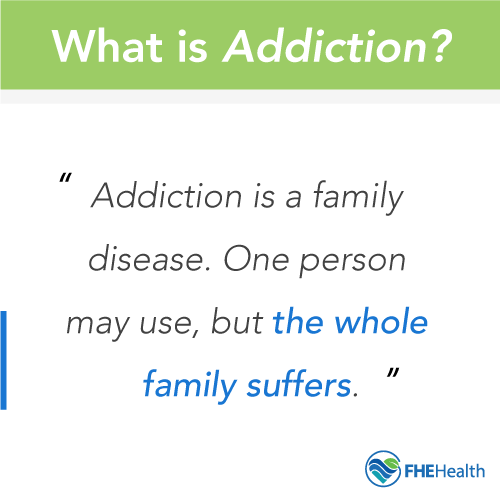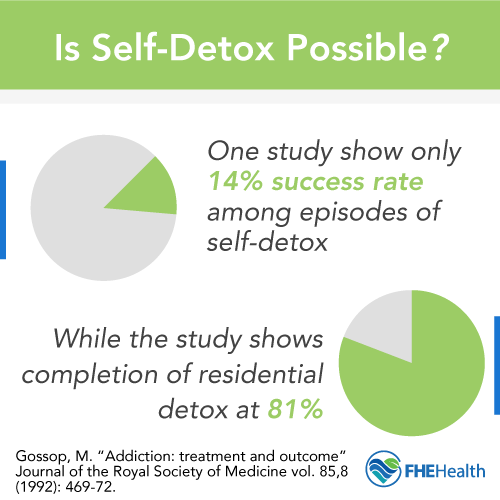Addiction is a serious disease that affects millions of Americans. Addiction doesn’t discriminate: it can affect anyone regardless of gender, age, color or creed. With the ability to upend lives, destroy relationships, ruin careers and even cause disability and death, addiction is a serious issue that often requires a professional treatment approach.
At FHE Health, we are committed to supporting healthy recovery by offering addiction treatment programs designed to promote lifelong wellness.
What Is Addiction?

Addiction can be both behavioral and physical; in addition to disordered behavior, addiction often leads to changes in brain chemistry. In combination, this can make ceasing use extremely difficult, leading to ongoing patterns of abuse without a strong likelihood for independent recovery. Due to the nature of addiction, ceasing substance use is almost impossible to accomplish alone.
Symptoms of addiction are often grouped into four categories:
- Loss of control
- Social problems due to addiction
- Risky or inappropriate behavior
- Increased tolerance and withdrawal side effects
Types of Addiction
Addiction isn’t a one-size-fits-all kind of disorder. Many substances can be addictive, both physically and psychologically. At FHE Health, we support all forms of addiction recovery, working to find healthy resolutions to dependence.
Chemical Addiction
Chemical dependency is often synonymous with substance use and refers to a pattern of drug abuse that results in both psychological and physical addiction. Due to the effects that abusing drugs can have on the brain, chemical dependence can be very challenging to overcome. For most users, the high associated with ongoing substance use is the main driver for continued use; the sensation of substance use creates a true desire to continue without any interest in cessation.
Common substances that can create a chemical dependency include:
- Opiates
- Hallucinogens
- Inhalants
- Prescription medications such as benzodiazepines and barbiturates
Behavioral Addiction
Behavioral addiction, also known as process addiction, refers to a dependence on certain enjoyable behaviors that, when abused, can trigger a high-like sensation similar to substance abuse. While behavioral addiction does not generally result in the same lasting physical changes as chemical dependence, such as the effects on neurotransmitters in the brain, the rush associated with a particularly enjoyable action is often a comparable feeling. These sensations make behavioral addictions equally hard to quit, creating a similar cycle of abuse that can be just as emotionally, mentally and physically damaging.
Virtually any pleasurable activity can be addictive, but the most common sources of addiction include:
While these kinds of addictions are often perceived as easier to quit due to the lack of a chemical element to dependence, addiction treatment programs are still frequently encouraged to ensure a healthy recovery.
Getting Addiction Help

Making the decision to get help is the single best choice you can make. While attempting to kick the habit alone seems compelling due to the time commitment and cost associated with treatment, professional supervision, medical intervention, and psychological care can increase the likelihood of success, facilitate a healthy approach to sobriety and decrease the risk of relapse.
However, the success of recovery often requires following a blueprint for treatment, and that generally means going beyond a few local 12-step program meetings. For most individuals facing addiction, particularly those with a substance use disorder, medical detox is the most important step. A process that addresses withdrawal symptoms, medical detox relies on the expertise of addiction medicine professionals, including doctors and nurses, to ease the pain of cessation, manage symptoms and address the physical component of addiction. Only after this process is complete can true healing begin.
Addiction Treatment Programs Offered at FHE
At FHE Health, we believe in promoting a comprehensive and multifaceted approach to care. We support addictions in all stages and to all substances, offering a fully customized strategy that targets both current symptoms and underlying challenges. With a full continuum of care designed to provide support every step of the way rather than solely at the beginning, we can offer types of treatment and the tools necessary to cope with life situations without the use of drugs, alcohol or risky behaviors.
Neuro-Rehabilitation at FHE
Unlike other programs that use the same resources for all patients or rely on guesswork to create a course of care, our unique neuro-rehabilitation method uses clinical testing to evaluate how being addicted has influenced your brain. Armed with the information provided by brain imaging, blood tests, and genetic testing, we use biometrics to design an approach to our addiction treatment programs that is most likely to offer a stable path toward sobriety.
Our neuro-rehabilitation treatment program uses a five-tier strategy that incorporates:
- Comprehensive Neuro-Psychological Testing
- Heart Rate Variability & Biosound Monitoring
- Quantitative Electroencephalography (qEEG)
- qEEG Guided Neurofeedback Training
- Electrical Nerve Stimulation Therapy
Our Continuum of Care
Some rehabilitation programs exist to serve a single purpose, but FHE Health offers a continuum of care that provides step-down programming from the first moments of treatment all the way to stable recovery.
Detox
Detox is the first step in overcoming addiction. At FHE, our clinical and medical professionals work with you to minimize the symptoms of withdrawal, using over-the-counter and prescription medication in conjunction with other therapies to provide support and stability while addressing chemical dependence.
Inpatient Rehabilitation
After you complete detox successfully, inpatient rehabilitation is the next step. Often lasting anywhere from four to eight weeks, time in an inpatient rehabilitation program offers a focused approach to care that balances mental, emotional and physical guidance. Our inpatient addiction treatment programs use a combination of group and individual counseling, healthy activities and holistic approaches to treatment, such as acupuncture and massage. Throughout this process, you’re taught coping methods that target the root of addiction in order to diminish the likelihood of relapse.
Partial Hospitalization Programs
Following the successful completion of inpatient programming, you move into an outpatient treatment program. Partial hospitalization programs, or PHP, allow you to leave the confines of a residential facility while still committing the majority of your free time to counseling and other forms of treatment. The standard commitment for PHP is usually eight hours a day, five days a week.
Intensive Outpatient Programs
A step-down from PHP treatment, intensive outpatient programs, or IOP, provide continued access to recovery activities while allowing for more freedoms like work, school and family commitments. A standard IOP plan involves around five hours of treatment three days a week or three hours of treatment five days a week. Programming may also be available in the evenings. During IOP, you’re encouraged to take on more of the demands of daily life while learning to cope without drugs and alcohol.
Alumni Care
Recovery doesn’t stop after the successful completion of detox, inpatient and outpatient rehabilitation. Our alumni care opportunities allow for continued connection to the recovery community, providing support and care for the challenges that sobriety can bring long-term. Alumni care also includes life support resources, including job placement and resume assistance.
Get Started With Our Addiction Treatment Programs at FHE Health
The addiction treatment programs at FHE Health offers a comprehensive approach in a safe, compassionate and supportive environment. Through every step of our continuum of care, we offer you the tools to overcome addiction and reclaim your life. Please contact us today to take the first steps toward sobriety.









